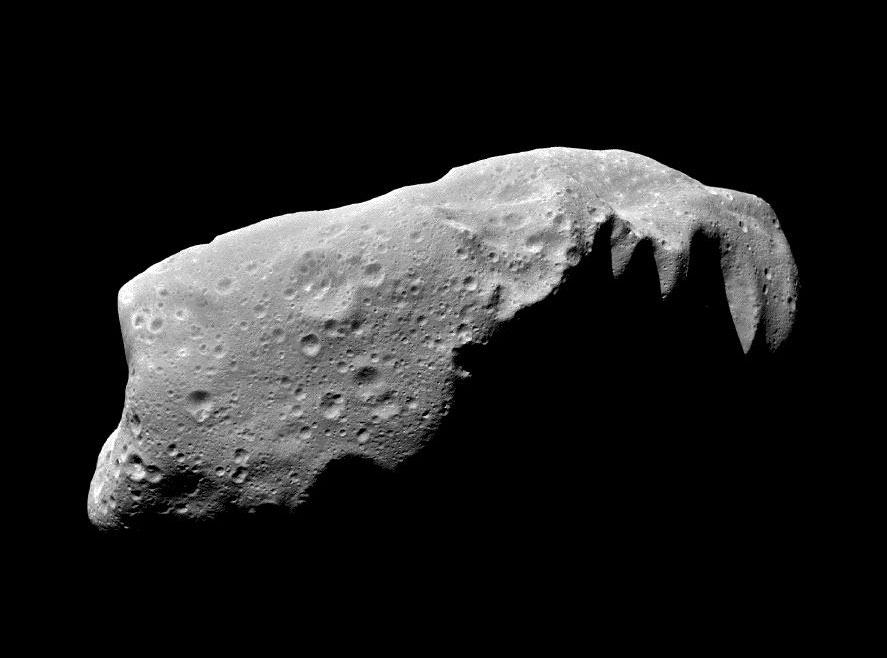In the early days of space exploration, humans had a vision that one day we’d be space explorers building space stations, travelling across the solar system and utilizing vast resources on the moon and other worlds.

Though we’re not there yet, it’s clear that our vision of exploring — and exploiting — space is close upon us.
READ MORE: Space exploration: Why do we invest in missions to asteroids and comets?
On Friday, the United States Senate passed a bill that included the right of American citizens to retain any resources obtained on an asteroid. They can even sell them.
In 1967, the United Nations Office for Outer Space Affairs created the 1967 Outer Space Treaty. Its intentions were to ensure that space was for everyone, with one of the first principles being, “the exploration and use of outer space shall be carried out for the benefit and for the interests of all countries and shall be the province of all mankind.”
So, of course in the U.S. bill they added, “in accordance with applicable law, including the international obligations of the United States.”
It may have taken us a long time to get our space-faring plans in order, but it seems that the ride to mine asteroids for valuable minerals has gained momentum. There are several asteroid mining companies, including Planetary Resources, co-founded by Peter Diamandis the brain behind the X-Prize, and Deep Space Industries.
And, though we’re not going to see mining operations on the moon or asteroids within the next few years, it’s clear that this is a burgeoning industry that stands to make some companies a lot of money.
But it’s unclear exactly how the new U.S. bill will align with the UN treaty. Still it’s clear that countries need to start thinking about the future of exploiting resources on other worlds, the most valuable of which is water which can be used for rocket fuel, water for humans and even radiation shielding.
“We are living in exciting times,” said Planetary Resources president Chris Lewicki.
For Lewicki, heading out to mine an asteroid is inevitable. With the U.S. passing the bill, they have just set the stage for protecting the interests of U.S. companies and individuals.
“What I think it allows is starting a 21st century conversation on the future of this industry,” said Lewicki.
Canadians in the market?
There are some Canadian connections with Planetary Resources — its advisors include Canadian filmmaker James Cameron and Canadian astrophysicist Sara Seager. But when it comes to a company invested in the future of mining resources in space, there are none.
Dale Boucher, CEO of Deltion Innovation (a company that produces the drilling technology for NASA and the Canadian Space Agency), is worried that Canada is going to miss its chance at an important and inevitable market.
- Green Party deputy leader given jail sentence for Fairy Creek old growth protests
- More financial institutes are offering crypto-services, survey shows
- Singh mulls TikTok return as U.S. nears potential ban over security fears
- EV sales in Canada rose in recent years despite higher interest rates. Why?
“The companies that want to do the mining, are all located in the U.S.,” he said. “It blows me away that Canada is sitting back waiting for something to happen.”
In 2018, NASA is launching the Origins Spectral Interpretation Resource Identification Security – Regolith Explorer (OSIRIS-REx ) spacecraft to an asteroid called Bennu for a sample-return mission, the first of its kind. On board are five Canadian instruments. Canadian instruments have also been on the Mars rovers, including the most recent, Curiosity.
So it seems almost ludicrous that a country known for its mining abilities as well as astounding success in robotics and space technology isn’t looking to step up on the asteroid stage.
“We understand about mining and how rock behaves,” Boucher said. Not that mining in space is the same as mining on Earth, he added.
“I think we’re on the balance point; And how Canada chooses to participate is a political decision.”
Ram Jakhu, associate professor of the Institute of Air and Space Law at McGill University in Montreal, agreed that the U.S. is just ensuring its place in the future of a potentially lucrative market and isn’t necessarily in violation of any international laws.
READ MORE: Canadian Space Agency to launch laser on near-Earth asteroid mission
But what does that mean to other countries, countries that are part of the UN’s Space Treaty? Will they be left in the cold?
“There are two possibilities,” Jakhu said. “One, countries ignore what the U.S. is doing… The other, they may take the matter before the UN.”
Lewicki said that the U.S. government has laid out a framework from which to build upon, and has taken a logical step.
“Where business goes, politics and regulations follow.”
“If you go out into space and obtain resources, the resources you pick up are your property.”
Is this the dawn of a new space age?
“Yes,” Lewicki said. “The first space race was a race of ideologies and governments and Cold War. We’ve seen in the last 34 years a space race of sorts that’s not about ideologies.”
“It is feasible, but it’s not going to happen tomorrow,” Jakhu said. “But I think Canada should make efforts.”
In response to queries about Canada’s role in asteroid mining, the CSA only responded with, “With regards to asteroid mining, the Canadian Space Agency follows progress on current exploration missions. Should new opportunities arise for future missions, they will be considered.”
UPDATE: The CSA contacted Global News by email, adding, “The Canadian Space Agency is not currently planning or involved in a mission to mine asteroids. We are however participating in OSIRIS-REx, the first US mission to study an asteroid and return a sample to Earth. We are not aware of Canadian companies similar to Planetary Resources.”


Comments